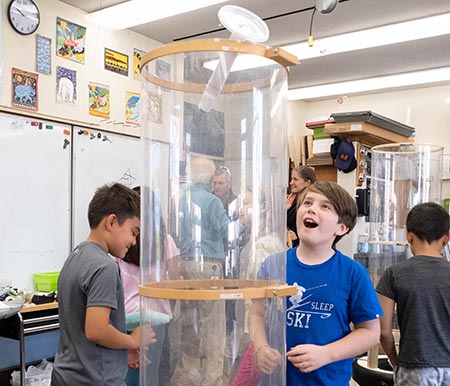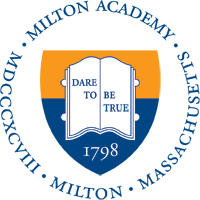Grade 5
Milton’s fifth grade students grow as conceptual thinkers and focus on understanding events and situations from multiple perspectives. Students learn how to uphold and effectively communicate their own ideas, while also practicing the critical skill of listening to others for understanding. They become increasingly independent, in their learning and their organization habits. They learn to pace themselves, managing short-term guidelines for increasingly complex long-term projects. Grade 5 students are role models for Milton’s Lower School, leading weekly meetings and serving as buddies to our youngest students in Kindergarten. Students in Grade 5 grow in confidence as they expand their leadership skills.
In Grade 5, students ask “What is leadership? How do leaders lead? How can I make an impact on the world?” They investigate United States history, economics, civil rights, civil law and women’s suffrage. They explore geography and Greek mythology and culture. Students strengthen their independent writing skills, responsible for editing and revising their own work. They develop proficiency in persuasive writing, and they write and present poems to peers and parents. Students begin using individual Chromebooks and are expected to manage much of their coursework using learning management software.
Math
- Content
- The role of measurement in 3D geometry
- Addition and subtraction with rational numbers
- Solving complex multiplication and division problems with an array of strategies
- Algebraic thinking and data analysis: analyzing rules and patterns
- Multiplication and division with rational numbers
- Geometric properties
- K–5 Math Practices
- Make sense of problems and persevere in solving them.
- Reason abstractly and quantitatively.
- Construct viable arguments and critique the reasoning of others.
- Model with mathematics.
- Use appropriate tools strategically.
- Attend to precision.
- Look for and make use of structure.
- Look for and express regularity in repeated reasoning.
Reading
- Reading workshop
- Analyzing themes across fiction texts: comparing and contrasting diverse authors’ approaches to similar themes
- Tackling the language and structural demands of complex nonfiction texts
- Researching debatable issues to form opinions and support them with evidence
- Fantasy book clubs
Writing
- Incorporating theme into narrative writing
- Historical research reports
- Compare and contrast structure and form across narrative and essay genres, and create an original piece in a hybrid genre
- Research-based argumentative essay
Social Studies
- Human Rights
- Going deeper with Indigenous peoples studies: First Nations
- Settler colonialism in the Americas
- The transatlantic slave trade and stories of resistance
- The American Revolution and the Declaration of Independence
- The Haitian Revolution
- Forming government in the United States and in Haiti
- Westward expansion and Indian removal
- The Underground Railroad
- The Civil War
- Women’s rights and suffrage
Diversity, Equity, Inclusion, & Justice (DEIJ)
- Anti-bias: creating a safe and comfortable classroom environment; understanding my strengths, skills, and identity; understanding and appreciating differences; understanding bias and discrimination; challenging and confronting bias
- Racial literacy: How immigration [and forced immigration] shaped the racial and cultural landscape of the US – the persecution, resistance, and contributions of immigrants and enslaved people
- Social justice: Who are the activists in my community? Art and activism.

